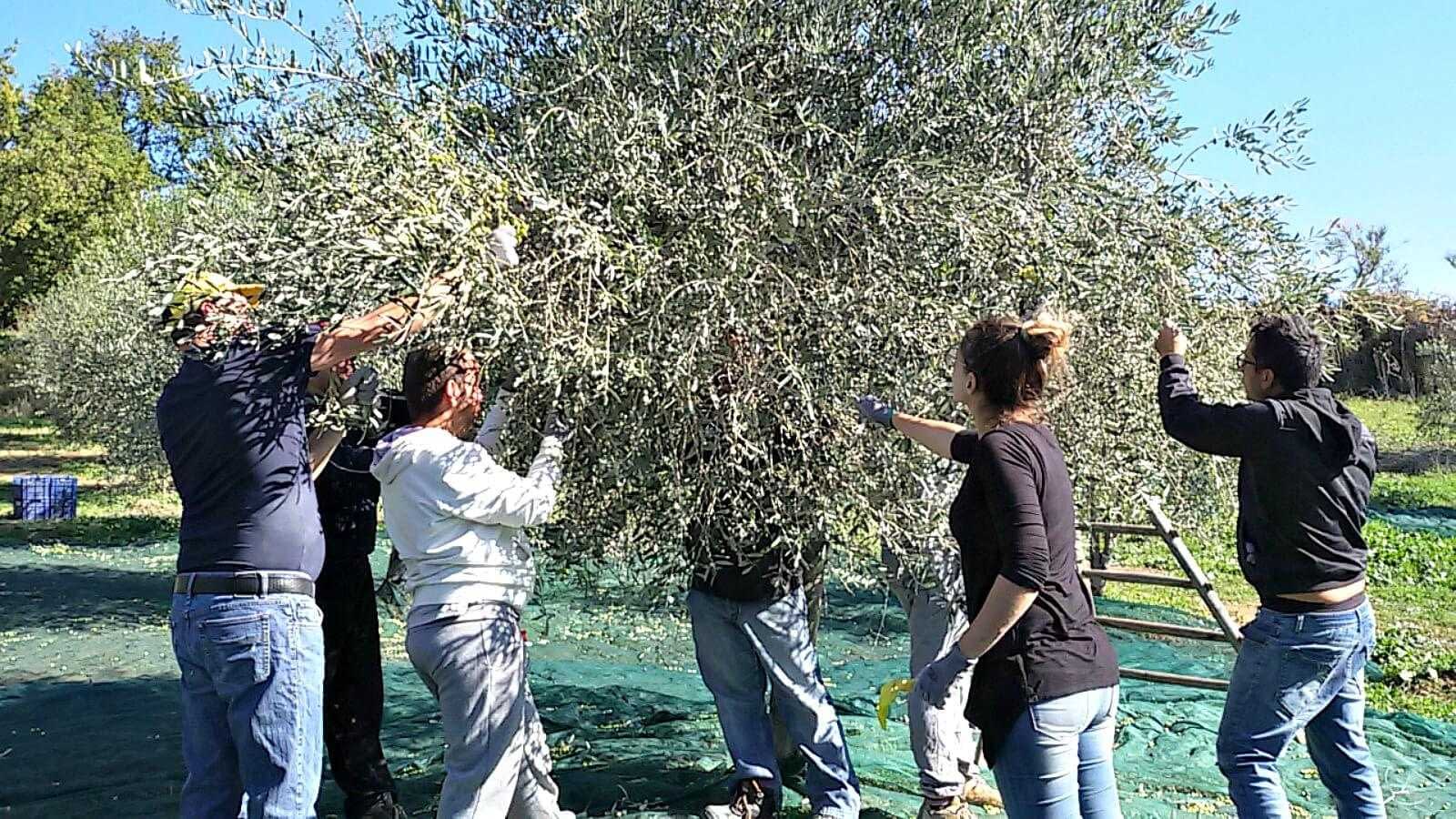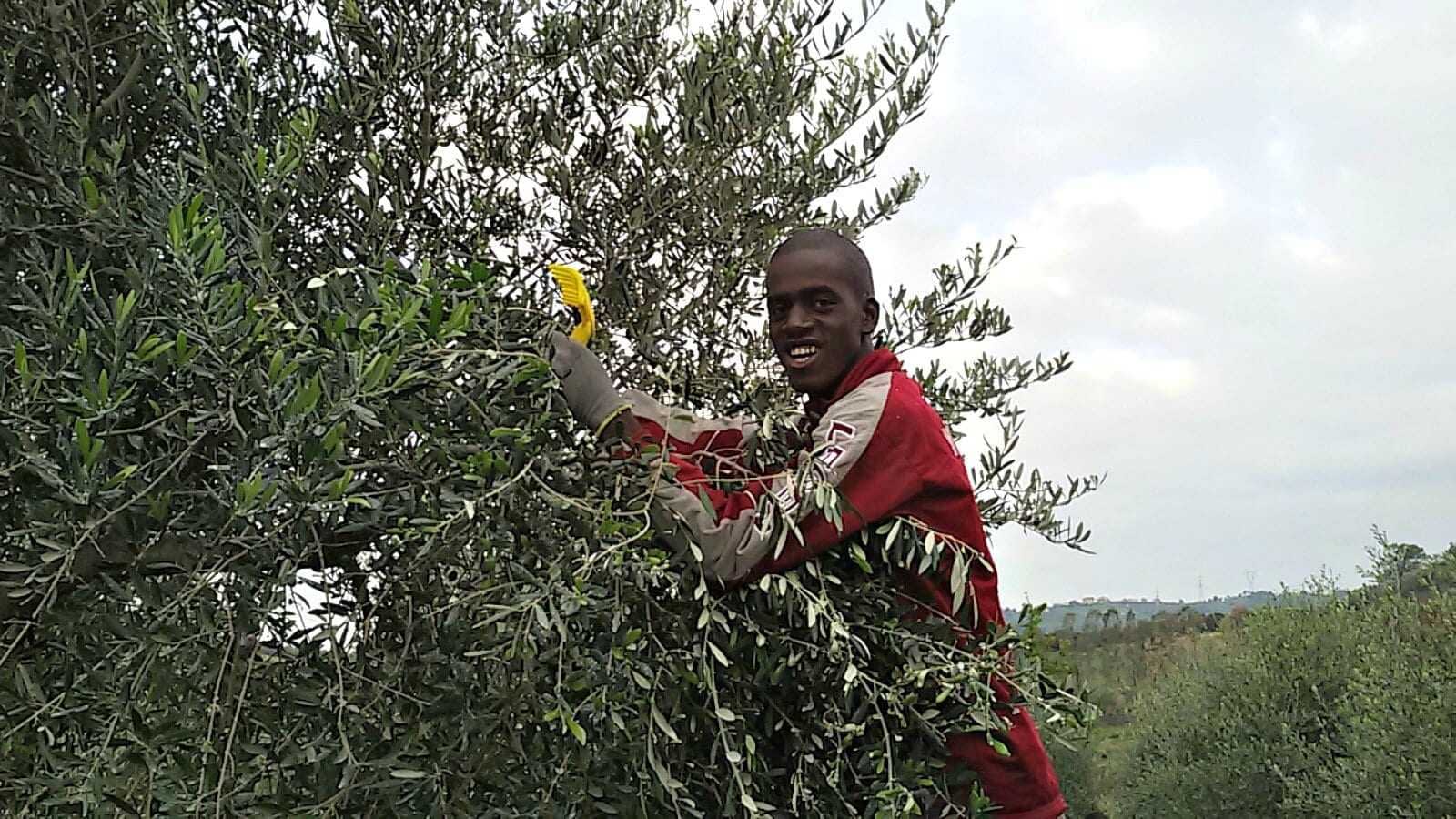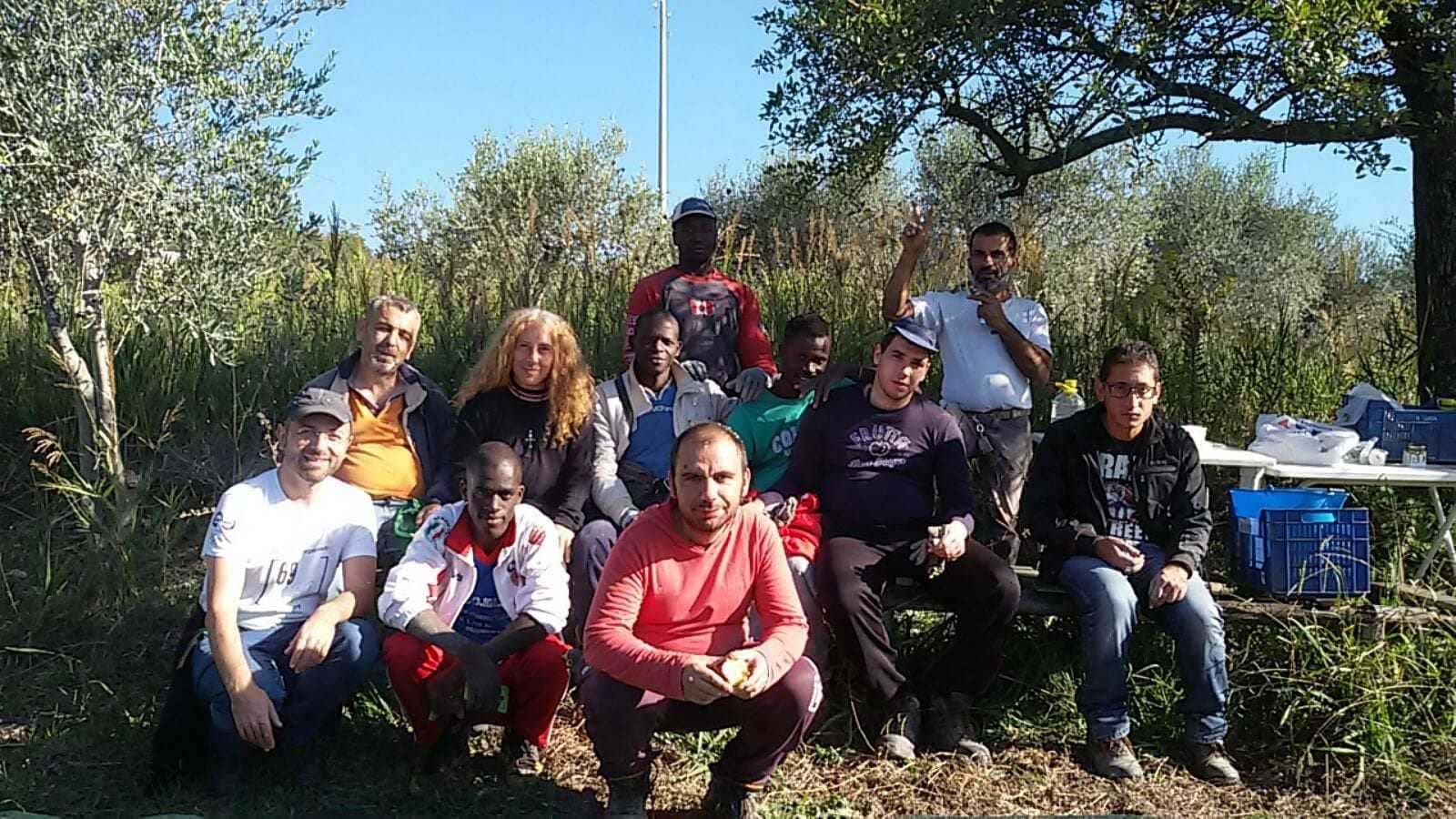Quality EVOO Production at the Heart of Italy's Social Farming
The Italian Social Farming system has become a model for the other countries.
 Harvest at Agricoltura Capodarco in Grottaferrata
Harvest at Agricoltura Capodarco in GrottaferrataSocial farming (SF), or care farming, is a practice that uses agricultural resources to provide social or educational care services for vulnerable groups of people, as defined by the Food and Agriculture Organization of the UN (FAO).
These social cooperatives were created to give disadvantaged people social and professional autonomy through socialization and work.
It aims to bring together needs, identities, protections and demands for freedom of all citizens, regardless of their abilities, according to the charter of the Italian Social Farming National Forum (FNAS), which underlines the value of work not only as an individual income source, but also as a founding element of a more just and inclusive society.
“SF can be a response instrument to the needs of the population, both in terms of sustainable agricultural production from an economic and environmental standpoint and in terms of the provision of social and health services,” said the spokesperson of the Lazio FNAS, Carlo De Angelis.
With about 400 social cooperatives, 4,000 workers and a €200 million turnover, the Italian SF system (regulated by the national law 141 of August 18, 2015) has become a model of best practice for the other countries thanks to its many social and qualitative achievements.
In this context, olive growing is practiced with great results, as is the case of Agricoltura Capodarco, which this year celebrates its fortieth anniversary of activity carried out on farms in Rome and Grottaferrata.
“These social cooperatives were created to give disadvantaged people social and professional autonomy through socialization and work,” said the president, Salvatore Stingo.
Their mission stems from the founding principles of the Capodarco Community, a non-profit organization which promotes and defends the dignity of marginalized people, especially those with a mental and physical disability, through a constant action of inclusion and integration.
“The daily commitment of our cooperative is based on two pillars, which are the central role of the individual and respect for the environment,” Stingo pointed out. “Over the years, our activity evolved and now we organically manage a company of about 40 hectares (almost 99 acres), which include a 2.5‑hectare (6.1 acres) olive grove in Grottaferrata and a smaller plot at Tenuta della Mistica, in Rome, consisting of about 800 ancient plants of Moraiolo, Frantoio, Leccino and Carboncella,” he illustrated.
The farms became over the years an integral part of the social and productive fabric of the territory thanks to the high quality of their production. Extra virgin olive oil is made by a team including operators and people with disabilities who participate in the social laboratories of the cooperative mainly focused on horticultural activities.

Harvest at Capovolti social farm
“Moreover, this year at Tenura della Mistica we collected olives with the collaboration of eighth-graders from a school of the district,” Stingo specified, referring to a beautiful rural area in the outskirts of Rome where olive trees flank a road that leads to the ancient Roman aqueduct.
“The moment of harvesting is not only very pleasant but also useful because it gives people the opportunity to see almost immediately the fruit of their work,” Stingo explained. “They pick olives and they can soon taste the oil, and this gives great meaning to the efforts they made. In this sense, the production of extra virgin olive oil is very effective.”
Hand-harvested olives are brought quickly to the mill of Americo Quattrociocchi, an experienced producer in Lazio. “Our supporters and consumers are so enthusiastic about the high level of quality improved over the years, that every season our extra virgin olive oil is sold out well before the harvest,” he revealed.
In less than an hour’s drive, we reach the therapeutic community of Palombara Sabina of the association Dianova, an organization which develops projects for the treatment of drug abuse.

Harvest at Capovolti social farm
“We host eighteen people who participate in a complete course of treatment,” said the director of the community, Massimo Bagnaschi. He explained that the therapeutic journey of people living in the community starts with the use of medicines and methadone at tapered doses and concludes with a socio-occupational reintegration which comprehends a series of agricultural activities, at the heart of which is the production of extra virgin olive oil.
“The territory of Sabina, characterized by rolling hills and clayey, draining soil helps us to produce an excellent oil from 400 plants of Leccino and Carboncella,” said Bagnaschi. “Last harvest gave us an intense fruity oil with medium bitterness and more persistent pungency.”
This year, thanks to a project funded by the Fondazione Terzo Pilastro Italy and Mediterranean, the cooperative had the opportunity to better focus on training in olive growing. “With the collaboration of the organization of producers OP Latium, we organized an intensive course on the production of extra virgin olive oil from pruning to harvesting, including information on different varieties and milling process,” he specified.
“First of all, Dianova is a therapeutic community but, along with the practice of production, season after season, we achieved a high level of quality,” the director noted. “Probably next year we will submit our oil to the Chamber of Commerce of Rome to obtain the DOP certification.”
Production activities in the organically managed grove are carried out by operators and people living in the community. “They learned the skills needed for this work so well that they are now able to achieve great results,” Bagnaschi observed, explaining that one community expert directs the work of other operators and residents, who deal with plants located on a steep slope which makes pruning and harvesting operations even more difficult.

Harvest at Capovolti social farm
“Extra virgin olive oil production is a means of rehabilitation and the most important occupational activity of the community,” the director added. “We propose our oil in exchange for a contribution to the community and the proceeds help us to implement projects so that we shall achieve the double aim of motivation and professional education, and of the economic support and satisfaction from consumers.”
This is the second production season at Capovolti farm, a social cooperative in Montecorvino Pugliano, in the province of Salerno, which support people with mental disabilities.
“The cooperative was founded three years ago thanks to a project funded by the Fondazione Con Il Sud,” said the director, Nathalie Franchet. “We call ourselves capovolti (upside-down) because in general you first create a ‘container’ and then you include people, when in fact we decided to take a path with people with fragilities and their families, some of which wanted to put themselves out there and invest in the cooperative.”
Now sixteen people, half of which are people with mental disabilities, run a 6‑hectare (15 acres) organic olive grove in the territory of the Picentini mountains. “We pay close attention to apprenticeships with our members because mental health is a special field, and rehabilitation needs a proper training process.” Every week, theoretical and practice training is scheduled at the cooperative, which is composed of a daycare and a residential unit, Casa Nadia, which host 10 people.
“The production of extra virgin olive oil is a means of… I say ‘conquest,’ rather than ‘rehabilitation,’ ” Franchet said. “Last harvest was effectively carried out by people who, three years ago, could not stay more than a couple hours in the field, and now are able to work safely for six hours.”
Ten operators, including psychologists and sociologists, and twenty residents work in teams of ten, of ages from 18 to 50, followed by an agronomist. “We collect the olives which in a few hours are delivered to the Torretta mill, in Battipaglia,” pointed out Franchet.
1,400 plants of Frantoio e Leccino are harvested by hand since the use of harvest tools can be unsafe due to the special condition of workers. Moreover, the harvest is facilitated thanks to an adequate pruning.
“Our second production was so good in terms of quality that it was already sold out in December, and this suggests that we are on the right path because although our goal is above all social, it was natural to improve the standards of production,” Franchet considered.
“Next year we will submit our oil to the certification body to obtain the Colline Salernitane PDO. The proceeds from sale allow us to finance our projects, that is why quality is a fundamental goal of our program,” she concluded.









